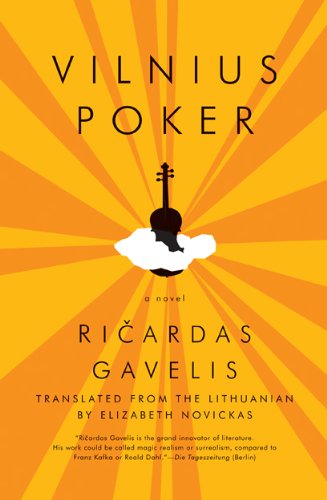
The full text from Sacha Arnold’s review of Vilnius Poker is now available online. Read it here or in the January 2009 issue.
Central Question:Why do they hate Lithuania?
Format: 485 pp., cloth;
Size: 5.5" x 8.5";
Price: $17.95;
Publisher: Open Letter;
Editor: Chad Post;
Print run: 4,200;
Book design: N. J. Furl;
Typeface: Arno Pro;
Translated from the Lithuanian by: Elizabeth Novickas;
Ratio of human to canine narrators: 3:1;
Year book was originally written in: 1986, kept in sections by friends of the author;
Author’s former occupations: physicist (he is also extremely passionate about basketball);
Representative sentence: “I felt brazen proboscises shoving their way into the very core of my being, there, where there is no armor.“
“That’s what they say,” we say, usually without much thought about who “they” might be. Vytautas Vargalys, the man at the center of Vilnius Poker, can’t identify Them either. But he also can’t ignore Them. In Lithuania under Soviet rule, They are everywhere, and he gives Them the perverse honorifics of capitalization and italicization in the first-person tirade that occupies more than half of this sprawling 485-page novel.
Vargalys is a programmer at a library in Vilnius, creating “an experimental computerized card index” for the institution’s many closed special collections. He exploits his free access to library materials, attempting to divine Their plans from the pages of books. “I don’t know why it’s in Lithuania in particular that Theyso openly show themselves,” Vargalys says, and in his account,Their hand in human events is shown by the endless numbers of the “kanuked,” idiot slaves to whatever regime rules them, crowding both the streets of Vilnius and the historical record. “Even entire civilizations are kanuked,” he reports, and Theyhave made it happen.
Naturally, the book’s central example of a kanuked civilization is the Soviet Union, which has incorporated Lithuania by force and which clapped Vargalys in the Gulag for eleven years. He blamesThem not only for his imprisonment but for every piece of ill luck he suffers after his release, especially the death of his great friend Gediminas Riauba. Gediminas, the polymath who “revealed the structure of the library” to Vargalys, is very much the presiding spirit of the novel, figuring strongly in both our first narrator’s diatribe and the “mlog” of his colleague Martynas Poška, which follows. Martynas offers the less crazed, less valedictory account, noting Gediminas’s “boundless ambition and snobbism” and stressing the unmetaphysical nature of his death.
The one challenger to Gediminas’s dominance over Vargalys’s consciousness (and the novel’s) is Lolita, Vargalys’s lover. As much the focus of tortured male longing as her Nabokovian namesake, she is described in terms both fetishistic and comically spiritual by the first two narrators, and offers the occasion for a number of stretches of what is essentially pornography. But Lolita is knocked off her pedestal in the account given by Stefa, the book’s only female narrator, who describes a seductress “weaving her net of long legs, sexy breasts, and bewitching glances” around the men.
The four narratives of Vargalys, Martynas, Stefa, and the philosophical dog who relates Vilnius Poker’s final section clash dramatically, both in their accounts of basic events and in their respective voices. Alternately wry, vulgar, reflective, and fluid, sometimes within the space of a page or two, the novel builds a composite consciousness from these voices. While its characters see the world differently, the world they see is one thing, not four. This is evident less in their accounts of contemporary events around Vilnius than in the intrusions of history and myth into the life of that city. When considering such intrusions, the narrators reach consensus: on the Iron Wolf and the Basilisk, on Hitler, Stalin, and the young communist who “liked to shape busts of Stalin out of the soft part of bread” but disappeared in the Gulag together with so many others. The nightmarish national trauma of Lithuania clouds everything, but also connects everything, opening spaces for shared memory and emotion. These spaces are the territories where Vilnius Poker most strongly and movingly coheres.
—Sacha Arnold




